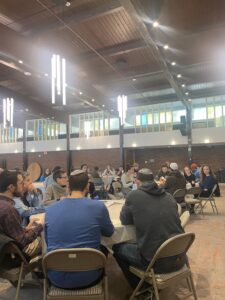Community Blog Winter Intensives Lay Foundation for a New Semester

Embracing pluralism and dialogue across difference, Hebrew College rabbinical students kicked off their learning in 2024 by steering through complicated conversations over two weeks of winter intensives.
Last week, in a seminar series sponsored by the Miller Center for Interreligious Learning and Leadership, students spent time with their cohorts learning about pluralism as a practice, and diving deep into religious traditions outside Judaism, including Christianity, Islam, and Buddhism. Studying with visiting scholars and teachers from these respective traditions, students took advantage of this opportunity to learn not only doctrine, but also about the complexity and nuance that comes with practicing in the world. “True dialogue across traditions can celebrate differences and points of connection,” says Rabbi Justin David, Dean of the Rabbinical School. “In looking deeply at any of these traditions, students will find values and approaches to the world that really appeal to them. And they will find points of divergence. All of that is what we want for our students.”

“By starting a new semester with a couple weeks of intensive learning sessions, we have a chance to come together and encounter each other outside our usual learning and social routines,” says Chaim Spaulding, Shanah Bet student and member of the faculty-student working group. “And we cross-pollinate the learning that we do all semester–very text-focused, skills-focused–with the insights we’re bringing from the rest of our lives.”
“Pastoral needs and leadership development are intimately intertwined,” Rabbi David says about the week of learning. “Pedagogically and experientially, how do we bring those different parts of ourselves into conversation with each other?” For a community of students who are working towards a future of Jewish leadership, this is a necessary skill, as questions of community and accountability can enrich and complicate the need to tend to their own internal struggles while deepening their understanding of this moment, its history, its heartbreaking complexities.
Over two weeks of seminar-style learning, rabbinical students have welcomed themselves and each other back to campus, and back to the challenging work of developing authentic and compassionate Jewish leadership. Both interreligious learning with guest faculty, and deeper dialogue about the complexities of the Israel-Hamas War, “create moments of constructive dialogue across difference and create opportunities for ongoing education,” Rabbi David says. “Together, these two things support a pedagogical culture of pluralism for our ordination students and prepares them to continue growing as they serve as rabbis and cantors in the Jewish community.”
Learn more about the Rabbinical School at Hebrew College here.

